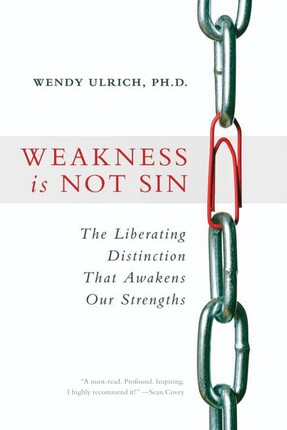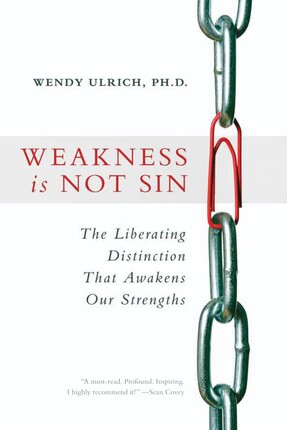The following is an excerpt from Weakness Is Not Sin: The Liberating Distinction That Awakens Our Strengths by Wendy Ulrich.
My husband, Dave, has long remembered a high priests class he once attended while visiting Jerusalem. The lesson was on the importance of the scriptures. The teacher, a convert from a humble background, asked if anyone had succeeded in reading the Book of Mormon all the way through. In the class were a number of visiting professors from Brigham Young University who had spent their entire professional lives studying holy writ. My husband felt a little embarrassed for the teacher, who didn’t seem to realize who his students were. Dave could almost read the minds of the class members as they settled into the assumption that they were probably not going to learn a lot in high priests class that day. There may have even been a little smugness in the group at having so excelled in their reading duties.
The teacher was wide-eyed as all the hands in the room went up in answer to his question. He could hardly comprehend that everyone in the room had read and reread a book that he found too difficult to finish at all. But then he began to share how he tried, nevertheless, to live the principles the scriptures teach. He humbly enumerated many ways he spent time with his family—hours spent helping his children, attending their events, playing with them, counseling with them, teaching them, and showing interest in their lives. He shared many personal examples of his involvement with each child. He expressed his love and deep commitment to them. The esteemed professors got quiet. They realized humbly that there are many ways to bring the scriptures to life in our lives. Their teacher, in his humility about his weakness, taught them from great strengths. . . .
The Workings of Grace
In response to our humility about our weakness, God offers to “make weak things become strong” unto us (Ether 12:27). There must be ways for weak things to become strong other than through noticeable improvement in our ability. The high priests teacher did not turn into an expert in ancient languages or a virtuoso at scripture chase just because he was humble. Yet he became a powerful teacher to learned men who could have easily trumped him in these skills.
The Bible Dictionary defines grace as an “enabling power” to do what we cannot do on our own.1 God’s gift of grace fits our need precisely: when we are weak, He offers power. While we often assume this means God will turn our chicken scratches into Shakespearean sonnets, the following is noteworthy: God didn’t change Moroni’s writing skill (the weakness Moroni fretted over) in any observable way. Despite the promise in Ether 12:27, Moroni’s writing seems to be of exactly the same quality after this promise as before. What might God have in mind when He promises that His grace will make weak things become strong unto us?
Let’s consider a weakness such as laziness, which could emerge out of either physical limits on our energy or emotional limits in our work ethic. How could God make this weakness become strong? I can think of several possibilities:
1. Eliminate the weakness. God’s grace could enable us to overcome a weakness completely. He could give us tremendous energy and a strong work ethic so we are not lazy anymore. This is what we wish for, but generally not what happens. Only occasionally will procrastinators become first movers, heavy people forever thin, or shy people party animals. How else might God turn weakness to strength?
2. Grow into strength. Grace could help us grow and improve in skill. For example, God could help us learn to manage our time better and learn the skills and attitudes of self-discipline to gradually improve on our laziness problem. While we are still predisposed to be lazy, we learn to combat it successfully at least much of the time by setting goals, enjoying the work we do, or breaking big tasks into small ones. This is a real and valuable possibility for turning weakness to strength, but there are others.
3. See both sides of the coin. Grace could help us learn to magnify the “good” aspects of a certain quality while minimizing the “bad.” We could learn to enjoy our leisure and relaxation time but not opt for such “laziness” when we have a big project due at work. This option acknowledges that laziness is not just a fault; it also has its appropriate place in our lives. There is an appropriate and legitimate time for being lazy! But grace may help us not make all the time “lazy time.”
4. Develop compensating strengths. Grace could help us develop compensating strengths, like learning to work really hard in short bursts to make up for our laziness or learning to be a great listener because we are not as busily at work as others. So our lack of energy and stamina might lead us to develop other skills of genuine worth, even if we are still lazy.
5. Acquire virtues through humility. As we are truly humble about our laziness or other weaknesses, God may teach us to be more compassionate about the laziness in others and about their other weaknesses as well. In a similar vein, He may help us be less judgmental, more forgiving, less critical, more charitable, less competitive, more reliant on Him, and less reliant on man—all of which are strengths or virtues of exceptional value to our souls. Such virtues come through humility, regardless of what specific weakness we need to be humble about. Might these be the strengths God is most interested in endowing us with through our weakness?
6. Participate in God’s generosity. Finally, God may simply compensate for our weakness with His Spirit and power, like testifying to others that our message is true even when we didn’t get around to writing our sacrament meeting talk until that morning because we were being lazy. This is where I am most in awe of God’s gracious and merciful kindness to me in my weakness.
Lead image from Wikimedia Commons
Get more incredible insights from Wendy Ulrich in Weakness Is Not Sin: The Liberating Distinction That Awakens Our Strengths.
In this powerful book, Dr. Wendy Ulrich poses the question: How often do we respond to weaknesses with impatience and guilt, mistaking human fallibility for sin? Ulrich explains that human weaknesses can either lead to sin, or to greater strength through the grace of God — but weakness itself is a morally neutral concept, separate and distinct from sin.
Ulrich cautions that while many become despondent at the prospect of eliminating weaknesses, weakness is really just a part of the human condition. As we distinguish between weakness and sin, we can begin to use our weaknesses for good. Without recognizing this distinction, however, we can experience excessive shame and “miss out on much of the healing and peace God longs to give us,” Ulrich writes.
With keen doctrinal and professional insights, Ulrich helps us understand that sin and weakness have different origins, lead to different consequences, and call for different responses. Understanding the liberating distinction between weaknesses and sin sets us free to feel worthy and find true joy in our redemption. As we understand this important principle, we can learn to focus on strengths, and not despair over that which we cannot change.




